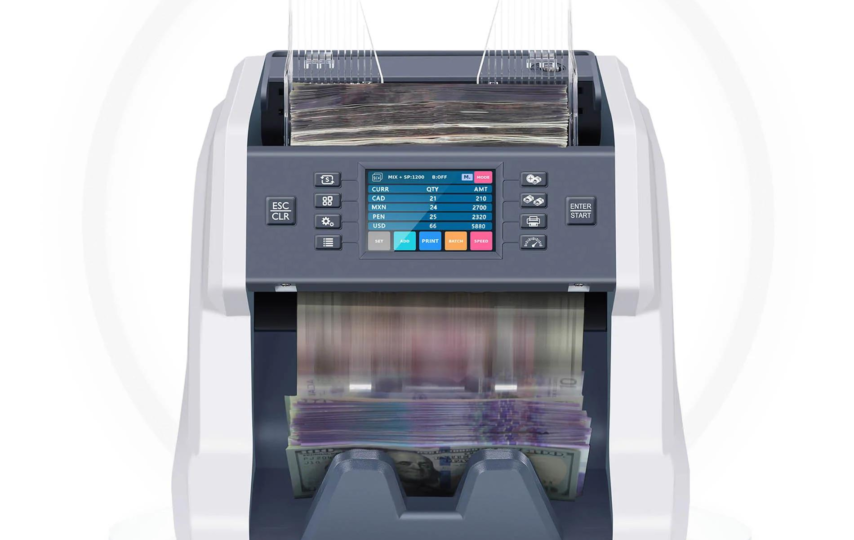Efficient cash management is crucial for any business, regardless of its size or industry. Accurate and timely cash handling helps to streamline daily operations, reduces the risk of errors, and ensures that your business runs smoothly. However, counting and managing cash can be a time-consuming and tedious process that requires a lot of manual labor. That’s where a bank-grade mixed value counter comes in handy. In this article, we’ll discuss what a bank-grade mixed value counter is, its benefits, and why you need one for your business.
What is a Bank-Grade Mixed Value Counter?
A bank-grade mixed value counter is a device that counts and sorts mixed denomination bills and coins. It can recognize and authenticate different currency types and denominations, and accurately count and sort them into separate compartments. The machine can count up to 1,500 bills per minute and is highly accurate, ensuring that the total amount of cash is always correct. It can also detect counterfeit notes, which is essential in preventing fraud.
Benefits of a Bank-Grade Mixed Value Counter
Time-Saving
A bank-grade mixed value counter saves time and reduces labor costs. It can count and sort a large number of bills and coins accurately and quickly, which means your employees can focus on other tasks that require their attention. With a mixed value counter, you can count cash in a matter of minutes instead of hours, which leads to increased productivity and efficiency.
Accuracy
Manual cash counting is prone to errors, which can result in significant financial losses for your business. A bank-grade mixed value counter is highly accurate and can count cash with precision, ensuring that there are no discrepancies in your cash handling. This accuracy also reduces the risk of fraud, as the machine can detect counterfeit notes and prevent them from being accepted.
Convenience
A mixed value counter is easy to use and requires minimal training. Anyone in your organization can operate it, which means that you don’t need to hire additional staff to handle cash. Additionally, the machine is portable and can be moved around as needed, making it convenient for businesses with multiple locations.
Improved Security
Counting cash manually increases the risk of theft and fraud. A bank-grade mixed value counter can reduce this risk by detecting counterfeit notes and ensuring that the total amount of cash is always accurate. This accuracy also reduces the likelihood of human error, which can lead to financial losses for your business.
Why You Need a Bank-Grade Mixed Value Counter
Saves Time and Labor Costs
One of the main reasons why you need a bank-grade mixed value counter is that it saves time and labor costs. Counting and sorting cash manually is a time-consuming process that requires a lot of manual labor. With a mixed value counter, you can count and sort cash accurately and quickly, which means your employees can focus on other tasks that require their attention.
Increases Efficiency
A bank-grade mixed value counter increases efficiency in your cash management system. The machine can count and sort mixed denomination bills and coins accurately, which means that your employees don’t have to spend time manually counting and sorting cash. This increased efficiency leads to increased productivity and reduces the risk of errors in your cash handling.
Reduces the Risk of Errors
Manual cash counting is prone to errors, which can result in significant financial losses for your business. A bank-grade mixed value counter is highly accurate and can count cash with precision, ensuring that there are no discrepancies in your cash handling. This accuracy also reduces the risk of fraud, as the machine can detect counterfeit notes and prevent them from being accepted.
What Is Cash Handling Expert
Cash handling expert refers to an individual or a team of individuals who possess extensive knowledge and experience in the management, processing, and security of cash transactions. The role of a cash handling expert can be crucial in various industries, such as banking, retail, hospitality, and transportation, where handling cash is an essential part of the business operations. In this article, we will delve into the role and responsibilities of a cash handling expert and the skills required to excel in this profession.
Role and Responsibilities of a Cash Handling Expert:
The primary role of a cash handling expert is to manage and safeguard cash transactions. This includes handling cash deposits, withdrawals, transfers, and reconciliations. The responsibilities of a cash handling expert can vary depending on the industry and the organization they work for, but some of the most common tasks include:
- Cash Handling Procedures: Cash handling experts are responsible for developing and implementing cash handling procedures that ensure the security and accuracy of cash transactions. This involves creating policies and guidelines for cash handling, training staff on these procedures, and monitoring compliance.
- Cash Counting and Reconciliation: Cash handling experts are responsible for counting and reconciling cash transactions to ensure that the amount of cash received matches the amount recorded in the accounting system. They must be able to identify discrepancies and investigate the cause of any discrepancies.
- Cash Storage and Transport: Cash handling experts are responsible for ensuring the safe storage and transport of cash. This includes determining the most secure storage locations, implementing security measures such as alarms and cameras, and managing the transportation of cash between locations.
- Fraud Detection and Prevention: Cash handling experts are responsible for detecting and preventing fraud related to cash transactions. This includes monitoring for suspicious transactions, identifying potential fraudulent activity, and implementing measures to prevent fraud.
Conclusions
In conclusion, a bank-grade mixed value counter is an essential tool for any business that handles cash. It can streamline the cash management process, improve accuracy and security, and ultimately maximize efficiency. Businesses that invest in such machines can save time and money while also improving the overall effectiveness of their cash handling operations.








